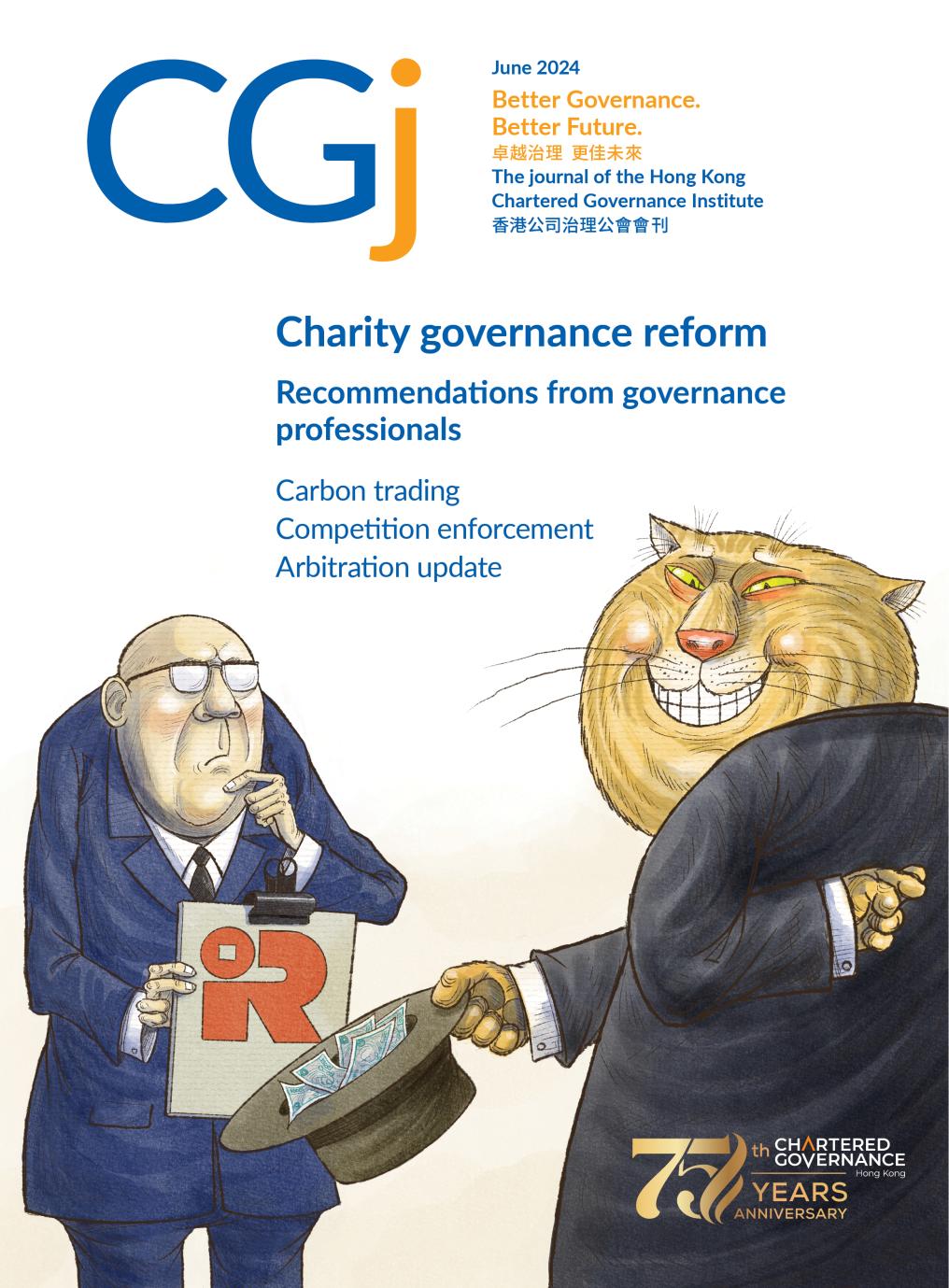Matthew Young FCG HKFCG(PE) HKCGI CERT: ESG, Institute Council member and Qualifications Committee Vice-Chairman, and Head of the Corporate Secretarial Department, The Hong Kong Jockey Club, examines the challenges faced by Hong Kong’s charity sector and proposes measures to help charities develop high standards of governance.
Highlights
- putting in place an internal control mechanism that is broad in scope can go a long way towards identifying and preventing irregularities
- promoting collaboration and sharing of best practices within the charity sector is crucial to enhancing governance
- enhancing charity governance requires raising public awareness of the importance of accountability, transparency and effective governance practices
As professional company secretaries, we live by rules and regulations set by external regulatory bodies to discharge our daily duties for private or listed companies. Internally, we need to comply with internal policies and standard operating procedures. Many of us may think that charitable organisations can similarly be governed by the same measures. However, owing to the lack of a compulsory regulatory and reporting framework for tax-exempted charities under section 88 of the Inland Revenue Ordinance, together with the dearth of professional guidance, we often see a ‘governance horror show’ in the public sector.
The two scandals mentioned in the previous cover story (the misappropriation of funds at the Christian Zheng Sheng Association and the child abuse case at the Hong Kong Society for the Protection of Children) are some recent examples that have shaken trust in this sector. While the majority of charities here are still being run honestly and diligently, governance issues within some have been a persistent concern.
while the majority of charities here are still being run honestly and diligently, governance issues within some have been a persistent concern
Charitable organisations play a very important role in Hong Kong’s social fabric, supporting causes such as healthcare, education and poverty alleviation. It is therefore understandable that the public is interested in how they are run and governed. To paraphrase the English poet John Donne, no charitable organisation ‘is an island entire of itself’ – charities cannot easily hide their mismanagement from public scrutiny, particularly in the modern age.
The current regulatory framework in Hong Kong
In Hong Kong, external oversight of charitable organisations is primarily conducted by the Inland Revenue Department (IRD) and the Companies Registry. The IRD monitors compliance with tax regulations, including charitable status requirements, while the Companies Registry ensures compliance with the Companies Ordinance. However, these regulatory bodies primarily focus on financial and tax-related matters, and it is hardly practical for their supervision to extend to wider governance issues within charitable institutions.
In the absence of an effective regulatory framework, internal oversight mechanisms play a critical role and the myriad problems now plaguing charitable institutions tend to arise when such mechanisms are absent or inadequate. Weak internal controls, lack of clear policies and procedures, and ineffective board governance structures can all contribute to mismanagement and financial impropriety. On the other hand, putting in place an internal control mechanism that is broad in scope can go a long way towards identifying and preventing irregularities. A recent article, ‘Philanthropy in Asia is becoming more professional’, published by The Economist in January this year, drew attention to the fact that ‘a general mistrust of non-profit groups – made worse by a string of high-profile scandals and poor marketing by cash-strapped charities – means donors prefer to execute projects themselves’. To address this, we need to create a more accountable and transparent environment for charitable organisations.
in the absence of an effective regulatory framework, internal oversight mechanisms play a critical role
Listed companies are subject to the detailed disclosure requirements set out in the Listing Rules. In contrast, beyond the need to disclose their audited financial figures, charitable organisations are generally free to report whatever they deem fit. How they run their charity programmes, how they train their staff, what level of internal control and integrity they require, and how their funds can be utilised by senior executives are not mandatory disclosures.
This lack of external control and monitoring is the root cause of many scandals. To turn things around, charitable organisations should establish board subcommittees, such as governance, audit, finance and risk management committees, to oversee different aspects of governance in detail. These committees should preferably comprise individuals with relevant expertise who can provide independent oversight and guidance. Clear policies and procedures should be established regarding financial management, conflicts of interest and decision-making processes, among others, to ensure transparency and accountability.
The need for a charity code and commission
The HKSAR Government has been enacting laws to tackle specific problems on an ad hoc and belated basis. For example, it has proposed a Mandatory Reporting of Child Abuse Bill, which stipulates that if professional practitioners in the social welfare, education and healthcare sectors have reasonable grounds to suspect that a child has been suffering serious harm, they must report the incident. The objective of the proposed new offence of ‘failure to protect’ is in line with the government’s policy objective of safeguarding the best interests and safety of children, and ensuring zero tolerance of child abuse. However, the Bill was introduced after the high-profile child abuse case mentioned above. Had a comprehensive charity governance code or a charity commission been in place, such incidents could well have been avoided.
In 2013, The Law Reform Commission of Hong Kong (LRC) recommended establishing a non-statutory code of best practice for charities. It also recommended that guidelines should be issued by a coordinating government bureau or department in relation to aspects of the protection and respect of donors’ rights and privacy, the contracting of services of professional fundraisers, and the recruitment of the elderly and the disadvantaged. It also proposed the creation of a register of charitable organisations in Hong Kong, which should be maintained by a government bureau or department and should be available for public inspection.
The LRC proposals were put forward after considering the responses to the LRC Charities Sub-committee consultation paper of 2011. The Home and Youth Affairs Bureau has subsequently taken into account the improvement measures recommended in the Director of Audit’s Report Number 68, as well as the Public Accounts Committee Reports Numbers 68 and 68A with a view to formulating a response.
Given the number of past scandals that have occurred in the charity sector in Hong Kong, and to address the inadequacy of internal supervision, the adoption of a charity governance code would have significant benefits for Hong Kong. There are many models out there that Hong Kong could draw upon (see ‘Charity governance in the UK’). As Sara Drake, Chief Executive of The Chartered Governance Institute UK & Ireland, said in a letter to the Financial Times in February this year, ‘corporate governance is merely a codification of past wisdom’.
Such a code would provide a framework for governance and would help establish best practices in areas such as board composition, transparency, risk management and financial controls. The adoption of a code would ensure that charitable institutions have clear guidelines to follow, leading to improved governance and accountability. Similar to the Corporate Governance Code in Hong Kong’s Listing Rules, the code could adopt different levels of enforcement obligations – such as ‘comply or explain’ provisions and ‘recommended best practices’.
The code should emphasise the importance of board composition, including the recruitment of diverse independent non-executive directors (INEDs). It should also outline the responsibilities of the board, including strategic planning, succession planning, financial oversight and monitoring the organisation’s impact. Akin to listed companies, charity directors should be appointed for a term and be eligible for re-election.
Some proposals
1. Appointment of INEDs
In the listed company sector, INEDs play a valuable role in providing independent judgement on the decisions made by the board. In addition, INEDs play a key role in the oversight of risk management and internal controls, and are a catalyst for ESG adoption.
The appointment of INEDs is less established in the not-for-profit sector, but the governance benefits are increasingly recognised. In 2023, for example, the Hong Kong Rugby Union appointed three INEDs to its board to ensure proper governance is in place. It is sometimes argued that small charities are unlikely to have the financial resources to appoint INEDs, but it should be borne in mind that many INEDs are willing to offer their services to local charities on a pro bono basis. Nevertheless, we must keep in mind that INEDs should not discharge their duties in a perfunctory manner. The level of their commitment is key to the success of this proposal. A case in point is the failure of Enron’s board, where 11 out of the 14 board members were INEDs, to properly exercise its governance duty, leading to the subsequent collapse of the company and its auditor Arthur Andersen.
2. Appointment of a company secretary
This proposal, also put forward in the previous cover story, would have significant benefits for charities in Hong Kong, particularly in terms of strengthening internal control, financial reporting and transparency. Listing Rule 3.28 states that a listed company must appoint a company secretary who is a member of HKCGI, or a barrister/solicitor or a certified public accountant (qualified personnel). There is an urgent case for the same requirement to apply to charitable organisations.
As with the INEDs discussed above, these qualified personnel could offer their expertise on a pro bono basis. The company secretary role is a critical component of effective boards and internal control. The best way that we can raise awareness of this is through public recognition of the quality of our work and the demand for high-calibre members of the profession.
3. Financial efficiency
The financial efficiency of charities is increasingly under scrutiny. In 2021, a local charity was challenged for its high operating costs, resulting in a relatively small percentage of donated funds reaching those in need. In the philanthropy sector, there is no definite answer as to what ratio of cost to benefit is ideal because every charity is run differently. However, it would be helpful for the public to be made aware of the most commonly used financial ratios by disclosing them in the charity’s annual report. These should include the:
- programme expense ratio – the percentage of expenses that a charity is spending on its core mission
- administrative expense ratio – the percentage of a charity’s expenses that are being allocated to administrative costs
- government reliance ratio – the extent of the charity’s reliance on government funding
- fundraising efficiency ratio – how much it costs to generate HK$1 of charitable contributions, and
- cash reserves ratio – the adequacy of the organisation’s resources that are available to support its mission.
4. Collaboration and sector-wide standards
Promoting collaboration and sharing of best practices within the charity sector is crucial to enhancing governance. In the UK, there are various governance academies to establish networks or associations that facilitate knowledge exchange, best practice recommendations and peer learning. These platforms can offer training programmes, workshops and conferences to promote governance excellence. Moreover, the sector as a whole can work towards developing sector-wide standards and benchmarks for governance, further raising the bar for accountability and transparency. A Charity Governance Academy would be a great idea for Hong Kong.
5. Public education and awareness
Enhancing charity governance requires raising public awareness of the importance of accountability, transparency and effective governance practices. Public education campaigns could help dispel misconceptions about charitable organisations and promote informed giving. By educating the public about how to evaluate charities, understand financial reports and assess governance practices, individuals could make more informed decisions about which charitable causes to support. The Institute, which has an essential role as an educator to promote good governance, has been offering seminars and courses in this space for its members and the public for some time.
Conclusion
The Honourable John Lee, GBM SBS PDSM PMSM, Chief Executive of the HKSAR Government, said in September 2023 that Hong Kong should develop its potential as a philanthropic hub. To this end, enhancing the governance of charitable institutions is of paramount importance to restoring public trust. Donors need to have confidence that their contributions will directly benefit the relevant cause. The current fragmented and ineffective regulatory framework in Hong Kong calls for urgent reform. By mandating the appointment of qualified company secretaries in charities and by developing a code of best practice, subject to a ‘comply or explain’ enforcement regime, we could create a more accountable and transparent environment, and advance the goal of truly turning Hong Kong into a global philanthropic hub.
Charity governance in the UK
The UK’s Charity Governance Code, developed by the Charity Commission for England and Wales (Charity Commission), offers a valuable model for Hong Kong to draw upon. The code is based on seven principles:
- organisational purpose
- leadership
- integrity
- decision-making, risk and control
- board effectiveness
- equality, diversity and inclusion, and
- openness and accountability.
It provides detailed guidance on each principle, helping charitable organisations to establish robust governance practices. Meeting all the recommended practices in the code is not a regulatory requirement, but a charity should explain the approach it takes to applying the code for the sake of transparency to anyone interested in its work. All trustees are encouraged to meet the principles and desired outcomes of the code by either applying the recommended practices or explaining what they have done instead, or why they have not applied it.
According to a survey conducted in the UK in 2022, over 90% of respondents had read the Charity Commission’s guidance. The majority of respondents said that they would appreciate the provision of an online guide setting out all the duties of those working in the charity sector. This is something Hong Kong could also consider adopting.
Matthew Young FCG HKFCG(PE) HKCGI CERT: ESG, Institute Council member and Qualifications Committee ViceChairman, and Head of the Corporate Secretarial Department
The Hong Kong Jockey Club



